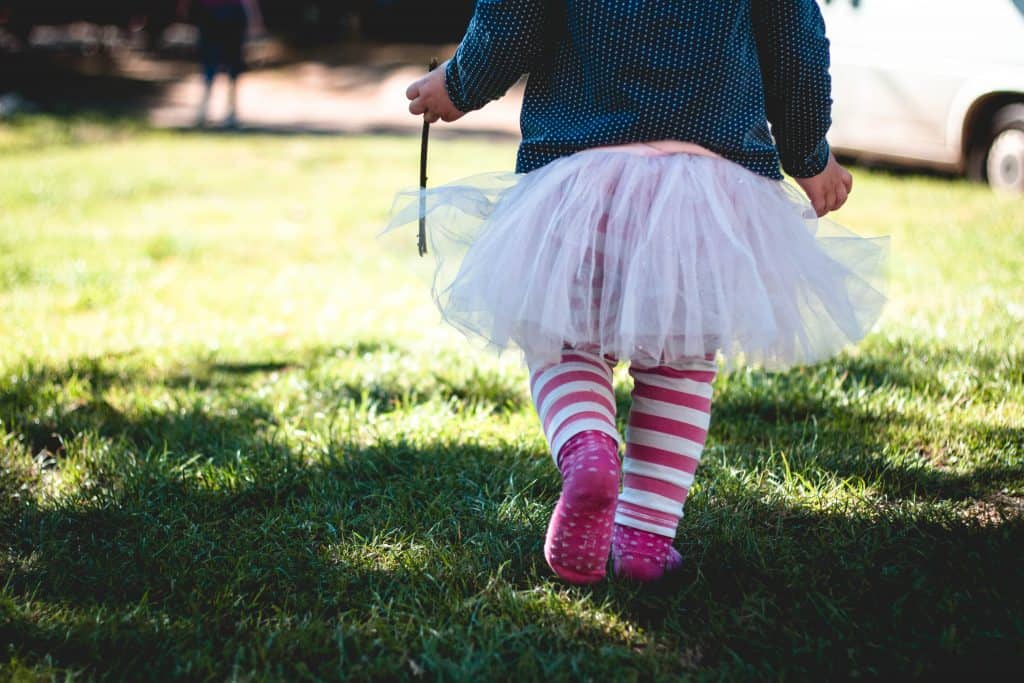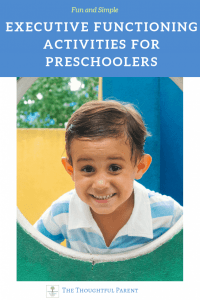Sneak peek: Executive functioning skills activities for preschoolers can help them develop much-needed skills like planning ahead, memory and self-control. Understanding how their brains develop can help us foster their skills.
Perhaps the alternate title for this post should be something like: “why your preschooler doesn’t take a coat when it’s cold outside.” I’ve been around young children to know that they often do not follow the directions or precautions you give them, no matter how many times you repeat yourself. So why is that? And how can we incorporate executive functioning skills activities into preschoolers’ lives to help them build these skills in a fun way?
Are they just choosing to ignore you? Or is there something different about the functioning of their brain that makes it difficult for them to plan ahead? New research shows that it probably has a lot more to do with the latter.

Executive Function Skills Activities for Preschoolers
In the past, many researchers thought that the functioning of young children’s brains was much like little adults: they could reason and plan ahead but just not as effectively as adults. New research is showing that this may not be the case. Instead, young children’s brains actually function quite differently, especially in regard to skills like planning ahead.
University of Colorado researchers conducted a creative study to understand how young children (3-year-olds) follow directions compared to older children (8-year-olds). They set up a simple computer game involving a set of rules:
– When a picture of the character Blue (from Blue’s Clues) was followed by a picture of a watermelon, the child was told to press the happy face button.
– When any other character appeared (e.g., SpongeBob Squarepants) they were told to press the sad face button.
– The researchers then used a device to measure the children’s eye activity to determine how much mental effort they were using to complete the task.
Related reading: The Fallacy of Early Academics: Why Play-Based Preschool Matters
What they found was that the older children had to exert very little mental effort to do this task because they could anticipate which picture was coming up next. Preschoolers, however, had to use more effort to think about which button to push in response to the game. They had to consciously think back to the character they had just seen, instead of being able to anticipate the future. This is why executive functioning skills activities for preschoolers are KEY–they need practice with these skills in order for them to become second nature.

What are Executive Functioning Skills?
So what does this mean for parents of preschoolers? As the researchers point out, this study seems to indicate that parents shouldn’t expect their preschoolers to think ahead, for example, and bring their coat when going outside, even if you told them in advance. Just repeating this type of information over and over probably won’t help. While your preschooler is probably listening to you, their brain doesn’t really retrieve this information until it becomes immediately needed, like when they step outside and realize it’s cold. The researchers put it this way,
“The good news is what we’re saying to our kids doesn’t go in one ear and out the other, like people might have thought,” said CU-Boulder psychology Professor Yuko Munakata. “It also doesn’t go in and then get put into action like it does with adults. But rather it goes in and gets stored away for later.”
Related reading: What Does an Effective Preschool Look Like? A Guide for Curious Parents
Part of the mental skills involved in following instructions and retrieving information is what we call executive functioning skills. You’ve probably heard educators talk a lot about this. Executive functioning skills like working memory, self-control and attention are crucial to children’s success in school and later in life.
Executive Functioning Activities: Games and Books
Executive function skills, however, take years to develop in children. As parents we can do things to help our children develop these skills:
Encourage pretend play
That’s right, PLAY! Think about the mental control it takes for a young child to stay “in character” when pretending to be someone else. This is great practice in working memory and impulse control. As always, play is the best way for preschoolers to learn and practice skills.
Books
It’s no big surprise that reading is helpful with developing executive function. As kids grow and develop their executive function skills, they can remember longer plots and more characters. Some books also teach lessons involving executive function skills like waiting, taking turns and controlling your language. Here are a few of my favorites:
Lilly has trouble waiting to share her new purse at school
Learning how to control yourself is not easy when you are only five.
Being first isn’t always best.
Sign up for this FREE printable list of fun ideas for preschoolers:
Games
Play games that require executive function skills like “freeze dance” or “Simon says.” Kids think they are just having fun but they are really challenging their brains.
Of course, children’s brains do eventually mature to the point that they can plan ahead and anticipate future events. Even the 8-year-olds in the study already had a much easier time completing the task than the preschoolers. In the meantime, this study is a good reminder that young children are not just like adults in smaller bodies.
Preschool games that foster executive functioning:
Pin and share with other thoughtful parents:










Mommyof2girlz
Stopping by from MBC 100’s to follow and say hello 🙂
Jen@born2impress
Coming from the 100’s club to follow:)
Follow you on twitter also.
Come visit when you have a chance.